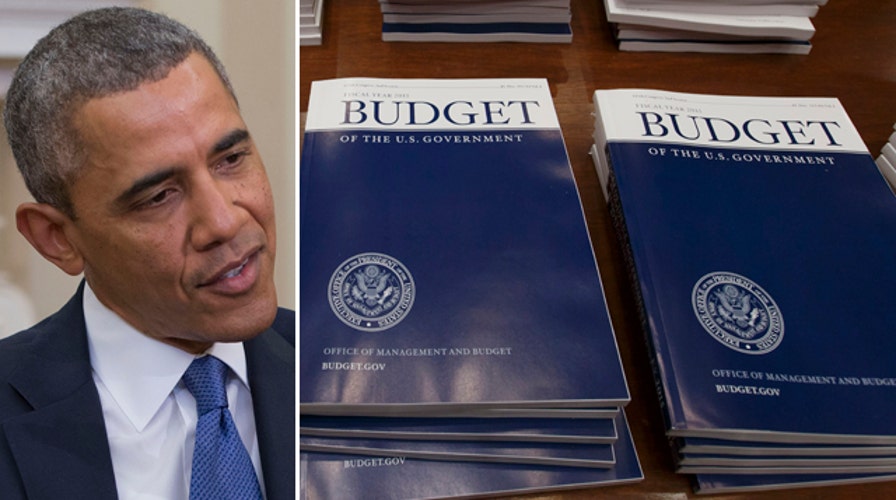Will Obama's budget fly with Congress?
Sen. Barrasso critical of president's spending policies
Despite spotty evidence that the billions of dollars spent on dozens of federal job training programs are delivering results, President Obama is proposing to spend billions more as part of his $4 trillion budget plan.
On the federal level, the government already spends about $18 billion a year to provide multiple services to unemployed workers on everything from career counseling to job training and searching. About half that money goes to Labor Department programs.
The White House, in pitching additional funding, is touting the efforts as a way to "equip" workers with the skills employers need, at a time when the unemployment rate is falling but not quickly enough.
"We know that while not all of today's good jobs are going to require a four-year college degree, more and more of them are going to require some form of higher education or specialized training. So this budget expands apprenticeships to connect more ready-to-work Americans with ready-to-be-filled jobs," Obama said in unveiling his budget on Tuesday.
But a look back shows that despite the president's push to retrain unemployed workers or create new government-backed jobs, the efforts have netted less-than-stellar results.
"Based on the track record the government has, it's counterproductive to spend federal dollars on these programs," Daniel Mitchell, a senior fellow at the Cato Institute, told FoxNews.com.
In 2003, the government spent $13 billion on training and employment services. By 2009, that number had jumped to $18 billion, according to the Government Accountability Office.
Today, nearly 50 federal programs deliver job training and related employment services.
In the latest budget proposal Obama sent Congress, the government would invest more than $3 billion in formula grants to states and localities for the more than 20 million Americans at 2,500 American Job Centers across the country.
Another $1.5 billion in 2015 would go toward a four-year $6 billion Community College Job-Driven Training Fund, which offers competitive grants to partnerships of community colleges, public and nonprofit training entities and industry groups.
But throwing billions at multiple programs hasn't worked so far, Mitchell claims -- faulting in part a lack of transparency.
Many job training programs don't monitor if participants end up finding long-term employment based on what they learned through the program. Of those that do, the data is unreliable at best.
For its part, the Obama administration says it is exploring ways to streamline access, more fully engage employers to ensure that training is well-matched to jobs, and improve efficiency. But others are skeptical.
A recent report by the Government Accountability Office found that there is "substantial overlap" among the programs and that "little is known about the effectiveness of employment and training programs we identified."
"That is remarkable -- taxpayers have been funding these sorts of programs since the 1960s, yet federal auditors still aren't sure whether or not they actually work," said the 2011 report "Employment and Training Programs: Ineffective and Unneeded" by Cato's Daniel Murphy and Chris Edwards.
Murphy and Edwards argue that various studies conclude that while "some programs may provide modest benefits," others "show no positive effects."
A 2008 impact study looking at the Workforce Investment Act -- which provides funding for job training and related services -- found that the benefits to unemployed workers participating in the programs were small or nonexistent.
In 1996, the GAO also noted that "little is known about the (the program's) long-term effects on participants' earnings and employment rates." The analysis found "no statistically significant improvement in wages over the long term from participation in JPTA training programs."
A decade earlier, the same conclusion was reached by the National Research Council regarding federal job training programs for youth.
The feds aren't the only ones with a questionable track record on job training programs. In Connecticut, the Republican-American recently reported that a program meant to help unemployed veterans has helped just about 100 find work over the course of two years. Far fewer were hired before the program was expanded -- the program was designed to give employers subsidies for hiring and training veterans.
Raffi Williams, a spokesman with the Republican National Committee, told FoxNews.com that the money the federal government is throwing at jobs training programs should be spent elsewhere.
"For the past five years, to the detriment of our country, the president has favored failing big government programs instead of proven job-creating policies, like building the Keystone XL Pipeline," Williams said. "The result, predictably, has been a stagnant economy, greater debt, and more burdens for future generations."
Instead, some say the real impact on jobs training programs could take place in the private sector. Mitchell said businesses are better-equipped to handle training and job searches within a company or sector.





